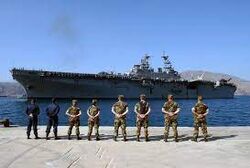US/Ambassador/Greece
(Ambassador to Greece) | |
|---|---|
 | |
| Start | 1868 |
| Important diplomatic post for military and intelligence reasons | |
Greece is an important diplomatic post. For many years, the intelligence work in the Middle East was run from Athens. The country is strategically situated, and over the decades since WW2 it has been necessary with steady US intelligence interventions to keep the country on the straight and narrow transatlantic path.
Truman Doctrine
The U.S. had largely ignored Greece since it was in the British sphere but lent $25 million on easy terms in 1946. However, it complained that its financial system was chaotic. The left (communists) boycotted elections in March 1946 that were officially held under international supervision, but was rigged against them. The US judged the election fair and supported the new conservative government, just like the plebiscite that brought back King George II. Behind the scenes, American diplomats tried to convince the government to end corruption. Fighting broke out in 1946. London secretly informed Washington in February 1947 that its funding would run out in a matter of weeks. A crisis was at hand, and the U.S. decided to act decisively.[1]
Truman won bipartisan support in March 1947 for the Truman Doctrine, which gave $300 million in military and economic aid to Greece and $100 million to Turkey. They were grants, not loans. Truman declared to Congress on March 12:
- It must be the policy of the United States to support free peoples who are resisting attempted subjugation by armed minorities or by outside pressures.[2]
Tito's split with Stalin and American aid helped the Greek government and Army to win the war; by 1949, the government forces had won the civil war. Greece joined NATO in 1952.[3][4]
Postwar
The U.S. provided Greece with more than $11.1 billion in economic and security assistance after 1946. Economic programs were phased out by 1962, but military assistance continued. In the fiscal year 1995, Greece was the fourth-largest recipient of U.S. security assistance, receiving loans totaling $255.15 million in foreign military financing.[5]
In 1953, the first defense cooperation agreement between Greece and the United States was signed, providing for the establishment and operation of American military installations on Greek territory. The current "mutual defense cooperation agreement" provides a continued U.S. military support to Greece and the operation by the U.S. of a major military facility at Souda Bay, Crete,[6] which serves as the largest and most prominent naval base for the United States in the eastern Mediterranean. Additionally, the Souda Bay base features the only deep water port in the entire Southern European and Mediterranean regions that is suitable and capable for maintaining the largest aircraft carriers, making it of vital importance.
Relations between the two countries were later strained by the Cyprus dispute and after the end of the Greek military junta, which particularly the Greek left considered to be backed by the U.S. In 1974, Greece temporarily left the military branch of NATO to protest the Turkish invasion of Cyprus.
The U.S.-Greek Defense Industrial Cooperation Agreement,[7] which was signed on September 8, 1983, regulates defense and intelligence relations between Greece and the United States. A revised and expanded Defence Cooperation Agreement was signed in 2019, with the aim of enhancing the close defense ties between the two countries.[8][9]
Office Holders on Wikispooks
| Name | From | To |
|---|---|---|
| Geoffrey Pyatt | 24 October 2016 | 10 May 2022 |
| Daniel Smith | 28 September 2010 | 5 August 2013 |
| R. Nicholas Burns | 22 December 1997 | 29 July 2001 |
| Thomas Niles | 8 November 1993 | 27 September 1997 |
References
- ↑ Robert Frazier, "Did Britain Start the Cold War? Bevin and the Truman Doctrine." Historical Journal 27.3 (1984): 715-727.
- ↑ see "Truman Doctrine" at Avalon Project
- ↑ Joseph C. Satterthwaite, "The Truman doctrine: Turkey." The Annals of the American Academy of Political and Social Science 401.1 (1972): 74-84. online
- ↑ Şuhnaz Yilmaz, Turkish-American Relations, 1800-1952: Between the Stars, Stripes and the Crescent (Routledge, 2015).
- ↑ Judith S. Jeffrey, Ambiguous Commitments and Uncertain Policies: The Truman Doctrine in Greece, 1947–1952 (2000)
- ↑ http://www.militarybases.us/navy/nsa-souda-bay/
- ↑ http://www.acq.osd.mil/dpap/Docs/mou-greece.pdf
- ↑ https://www.aljazeera.com/news/2019/10/greece-hail-strategic-relationship-signing-defence-deal-191005175854999.html
- ↑ https://www.neweurope.eu/article/greece-and-us-ink-new-defence-deal-and-extend-strategic-dialogue/